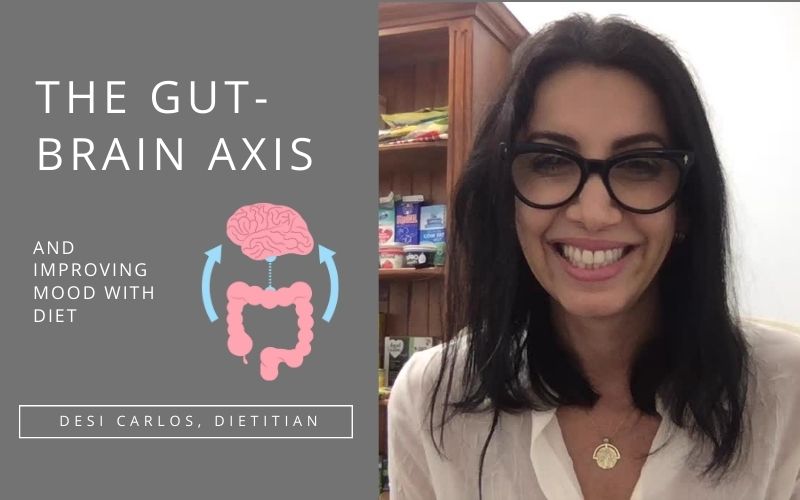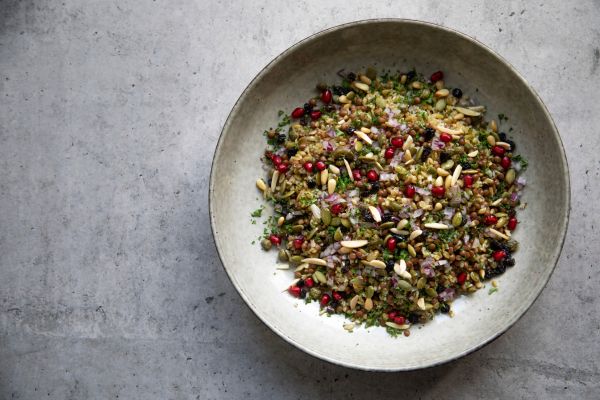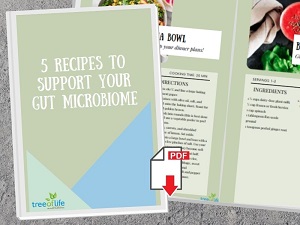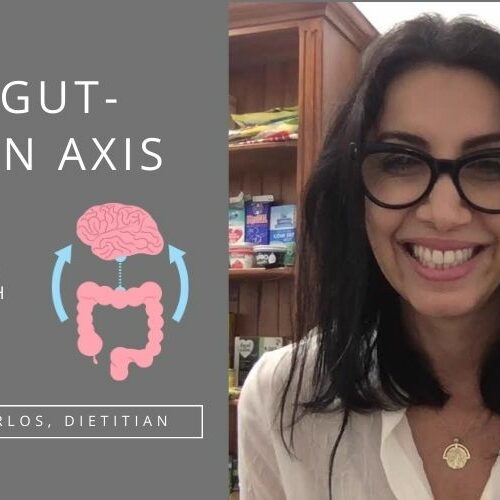
Have you heard about the gut-brain axis, and wondered what it means? Perhaps you have a vague idea, but not sure about the science of it all? Maybe you’ve experienced the gut-brain connection in your own life? As a dietitian specialising in gut health, mental health nutrition and complex diseases, I’m here to tell you, the more we research, the more we find a stronger connection between the health of our gut, and our brain health.
So hit play on my latest video, or keep reading below, to find out how. all about this fascinating and dynamic area of nutrition and dietetics, the gut-brain-axis. And how the gut and microbiome plays a significant part in mood and overall health.
How the gut-brain axis works
The gut and the brain have a two-way communication process, also known as the gut-brain axis. The communication between the gut and the brain occurs primarily along the vagus nerve.
Q: What is the vagus nerve?
The vagus nerve is a major nerve that runs from the base of the brain, across the chest and into the heart and abdomen. It services the major visceral organs, giving feedback back to the brain. Recent research into the gut-brain axis shows that our gut microbiota play a significant part in the gut-brain-axis. So much so, that microbiota can hijack vagus nerve signalling to alter brain and behaviour. It stands to reason that an imbalance of gut bacteria (dysbiosis) has the potential to change our mood and/or behaviour via the gut-brain axis, and the vagus nerve.
What influences gut dysbiosis?
Dysbiosis, or what we call imbalance of the good or bad bacteria in the gut, can actually be influenced by many things, including overuse of antibiotics, anti-inflammatories, antidepressants, and many more. These all can lead to symptoms such as irritable bowel syndrome, which is changes in bowel motions, bloating, abdominal pain, and wind. Dysbiosis can also be caused by any inflammation in the body. This, of course in turn, affects the lining of the gut, which affects your immune system.
Increasing microbiome diversity improves the gut-brain connection
How can we make some practical changes here in order to improve the gut-brain axis and both our digestion and our mood? Studies have shown that the Mediterranean diet actually decreases inflammation in the body, and it is responsible for improving gut microbiome diversity.
So that means that by consuming a Mediterranean Diet, we can decrease pain and decrease all other parameters of autoimmune disease, and we can increase the different types of bacteria in our gut.
Improving mood with food: 8 ways we can increase microbiome diversity and improve the gut-brain axis
- Reduce processed or packaged foods Move towards a whole-food diet.
- Reduce preservatives and additives. They disrupt the lining of the gut, and they also disrupt healthy bacteria that live in the gut.
- We should consume a high-fibre diet, which is basically a rainbow of vegetables and fruits, so different colours.
- Eat whole grains. Even though a lot of people are scared to have carbs. We need to have between two and four servings of whole grain breads and cereals to achieve diversity.
- Legumes such as chickpeas, lentils are also important.
- Include some probiotic-rich foods like yogurt, kefir, kimchi sauerkraut, feta olives
- Reduce your added sugars to reduce down the candida and other yeasts in the gut.
- Follow the Mediterranean diet and increase fish, reducing chicken and red meat.

In summary, let’s eat more fibre. Let’s reduce animal fats. Let’s have probiotic-rich foods. Reduce your sugar, eat less preservative and additive-based foods and enjoy good mood, good health, and most of all, better mental health.
Join us at the Gut-Brain Axis Seminar
I’m just scratching the surface of this fascinating area of nutrition here. If you’d like to know more, we’d love for you to come along to our next event, all about the Gut-brain Axis.
Find out exactly how the gut-brain axis works! Why when you’re stressed your bowel movements change. Or when you’re having ongoing bloating, abnormal bowel movements, and stubborn weight gain, your mental health declines. It’s all connected. In this seminar and 2-course banquet at Nostimo Restaurant Greek, Club, Brisbane, we’ll also leave you with practical tools to improve your gut-brain connection. And show you how to reprogram the signals sent by this nerve via exercise, psychology and nutrition.
Our speakers
- Desi Carlos – Dietitian & Nutritionist. Desi will demonstrate how a balanced gut microbiome is key to setting up a positive relationship between the gut-brain axis.
- Jade Kubler – Exercise Physiologist. Jade will talk through the role of exercise in the gut-brain axis, including practical applications such as vagal nerve stimulation and promoting the release of neurotransmitters with exercise.
- Mette Parkinson Gilligan – Psychologist. Mette will present the psychological theory of the gut-brain connection as well as provide practical tips for taking control of the autonomic nervous system and vagus nerve pathways.

Want a sample of recipes that support better gut health?
We have compiled a free recipe booklet with some easy and tasty Mediterranean-inspired recipes which are also great for overall gut health. Why not give them a try? If you want more Mediterranean ideas and recipes, we also have published two books dedicated to Mediterranean cooking, eating and living.
DISCLAIMER:
The content in this article is not intended as medical advice. It is also of a general nature and is not tailored to your individual circumstances. If you are experiencing significant digestive symptoms, a 1:1 consultation is always the best approach. Please contact our clinic to discuss your unique situation and our tailored and individualised gut health protocol.




